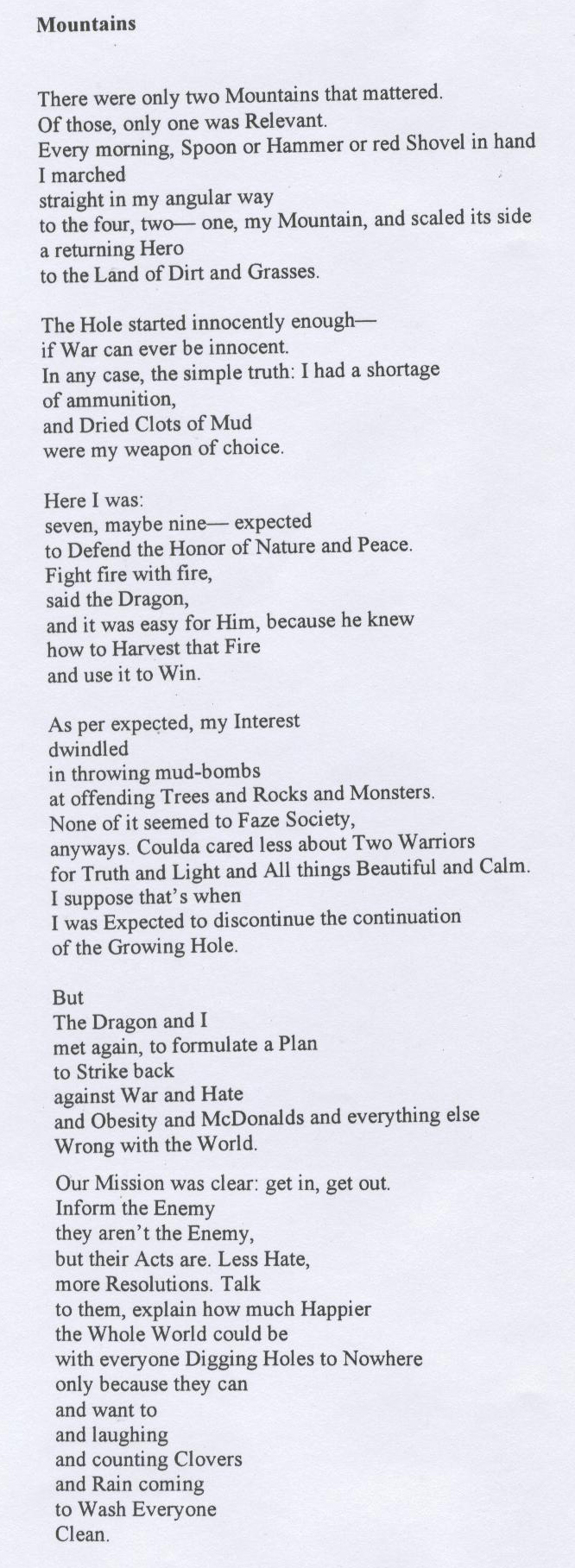2012
SARAH MOOK
POETRY PRIZE RESULTS
6-8 FIRST PLACE
Morganne
Elkins
Edgecomb, ME
 |
|
COMMENTS FROM CONTEST JUDGE MARIE KANE: "Mountain" relates a memory of an earlier childhood activity that has great meaning for the speaker, and by the end, for the reader as well. The poem's tongue-in-cheek tone, wry humor, and use of mature syntax and diction brought it to the forefront. Also, the title is very fitting for the meaning of the poem. In this first place poem, the random capitalization is purposeful and playful, the language absorbing, the tale meaningful, and the last lines wistful, yet powerful. The poet opens with the telling of his or her journey to a place of childhood play. It is a journey to a "Relevant" mountain:
Note the maturity of the word "Relevant," and the phrases "Spoon and Hammer or red Shovel in hand," and "marched / in my angular way," which demonstrate this poet's talent with vivid word choice and description. They also speak to the fascinating contrast throughout the poem between elevated language and informal, even immature, language. The verb "marched' and the adjective "angular" are especially gifted in describing the determination of the speaker in his or her quest up the "Mountain." The use of initial capital letters, especially "returning Hero" to the "Land of Dirt and Grasses" shows conscious and smart use of random capitalization. (As an aside, the choice to use or not to use capitalization is a serious one. Poetry gives the writer artistic freedom to use capitals or not, punctuation or not, spaces or not, etc.- in other words, to place or not to place limitations on his or her writing. The writer of "Mountain" chooses to use capital letters in ways that defy convention; by doing so, he or she professes the individualistic and unusual nature of poetry. In full circle, the central idea of the poem professes the need for an individualistic and unusual reaction to conflict.) The second section takes the reader to the speaker's action on the top of the Mountain. We are told "The Hole started innocently enough- / If War can ever be innocent." This wry acknowledgement of the dangerous and non-romantic nature of war speaks to the heart of the poem. Then the poet states outright: "In any case, the simple truth: I had a shortage / of ammunition, / and Dried Clots of Mud / were my weapons of choice." The previous adult conclusion about war, "If War can ever be innocent," is followed by this childish "ammunition"-"Dried Clots of Mud"-an incongruent, and delightful, parallel to the poem's theme suggesting that the use of any weapon of war, and even war itself, is anything but innocent. In the next section, we are given specifics of this conflict. The writer is "seven, maybe nine" (the missing 'eight' is just right), and "expected / to Defend the Honor of Nature and Peace." (How many wars are begun with that apparently harmless call to arms?) Next, the cliché, "Fight fire with fire, / said the Dragon," brings us back to childhood. What an appropriate metaphor to use to describe how wars are fought: "Fight fire with fire." The poem goes on to say that it "was easy for Him [the Dragon], because he knew / how to Harvest that Fire / and use it to win." The belief that there is a dragon with fire "who knew how to win" is logical in a young person, but the verb "Harvest" elevates the language and concept. I admire the opening of the fourth section. It begins, "As per expected"-the maturity of this phrase contrasts with the youthful description in the next lines. Here, the writer explains:
The understanding of conflict's ineffectiveness is clear here. The speaker goes on to say that Society "Coulda cared less about Two Warriors / for Truth and Light and All Things Beautiful and Calm." This epitomizes the ironic contrast between using weapons of destruction representing "Truth and Light and All Things Beautiful and Calm" that all societies claim when going to war. At the end of the section, the speaker assumes that he or she is "Expected to discontinue the continuation / of the Growing Hole" or, perhaps, to surrender. As all satisfying poems do, the direction of this one turns at the ending of the poem. The speaker states that:
Adding "Obesity and McDonalds" to "everything else / Wrong with the World" pleases with its droll humor. The important change here is that the Dragon and the speaker will now attempt to "Strike back / against War and Hate" and not be participants in them. The
"Mission" is clear in the last section. They will "Inform
the Enemy / they aren't the
This cleansing wish for the end of war may suggest naiveté on the part of the speaker, yet it may also imply courage and inventiveness; and perhaps the reader's hope as well. With its random capitalization, formal and informal language, and mature tone, this poem is a pleasure to read. It is a gem of grandiose ideas and playful wishes-and at its center, an earnest, and honest, desire for peace. Thank you for the privilege of reading your work! Marie
Kane |